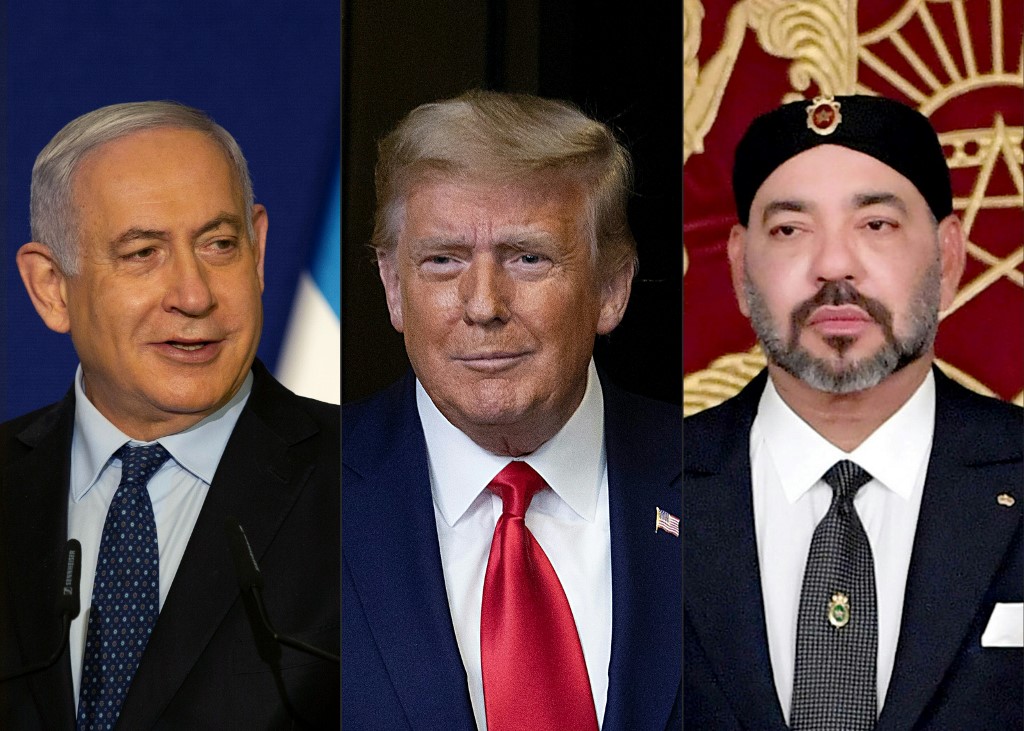Palestinian leadership silent over Morocco, Israel deal to normalize relations
AMMAN: Mainstream Palestinian leaders on Friday remained shtum over news that Morocco had become the latest Arab nation to agree to normalize relations with Israel.
Opposition factions such as Hamas, Islamic Jihad, and the Popular Front for the Liberation of Palestine (PFLP) were quick to criticize Morocco’s pledge to set aside hostilities toward Israel “in the near future.”
Under the US-brokered deal, announced by American President Donald Trump, the US will recognize Morocco’s long-standing claim to the Western Sahara region, rejecting calls by the territory’s Saharawi people for independence.
The Moroccan royal court issued an official statement on Thursday reporting that King Mohammed VI had called Palestinian President Mahmoud Abbas to give him reassurances that Rabat’s position on the Palestinian cause, in supporting a two-state solution, remained unchanged.
However, there has been no official Palestinian leadership response to the monarch’s call or Morocco’s decision to join the UAE, Bahrain, and Sudan in this year agreeing to normalize relations with Israel.
The official Palestinian news agency WAFA and main daily newspapers Al-Quds and Al-Ayyam did not cover King Mohammed’s phone call.
Ali Jarbawi, a political science professor at Birzeit University, told Arab News that the Palestinians were keeping quiet on the issue in a bid to avoid repeating previous errors. “The Palestinian leadership doesn’t want to repeat the mistakes it had when the UAE and Bahrain normalized relations,” he said.
Former Palestinian minister, Ziad Abu Zayyad, told Arab News that Morocco had always kept a good relationship with Moroccan Jews who immigrated to Israel.
“Morocco has had all the time a de facto relationship with Israel including visits of Israeli MKs (members of the Knesset) and ministers mostly from Moroccan origin.” But he noted that Israeli Prime Minister Benjamin Netanyahu had been “exaggerating” when describing the recent development as a breakthrough.
The Moroccan royal court statement said: “His Majesty (King Mohammed) stressed that Morocco always puts the Palestinian issue at the same level as the issue of the Sahara, and that Morocco’s work to consolidate its Moroccanness will never be, neither today nor in the future, at the expense of the Palestinian people’s struggle for their legitimate rights.
“The king of Morocco has a special status, and he has distinguished relations with the Jewish community of Moroccan origin, including hundreds of thousands of Moroccan Jews in Israel.”
About 2,500 Jews are currently citizens of Morocco which had a Jewish minister of tourism, Andre Azoulay.
Hamas and Islamic Jihad issued scathing attacks over Morocco’s agreement with Israel.
“Normalization by Morocco with the Israeli occupation is a betrayal of Jerusalem and of Palestine. We trust that the Moroccan people will utterly refuse this normalization,” Islamic Jihad said.
The PFLP, which has strong relations with the Polisario Front, also criticized the normalization plans. The Polisario Front is an Algerian-backed independence movement that holds a fifth of Western Sahara and has campaigned for a vote on self-determination through decades of war and deadlock.
Former Palestinian Labor Minister Ghassan Khatib told Arab News that the Moroccan decision was short-sighted and would harm Arab interests. “This has a negative effect on the regional Arab system and hurts Palestinians because it rewards the Israeli occupier which violates international law.”
He said that US recognition of Morocco’s sovereignty over the Western Sahara was allowing “Israeli continued control over Jerusalem and the rest of the occupied Palestinian territories.”
Some analysts believe that official normalization of relations could tamper down an anti-peace with Palestinians trend in the Israeli Jewish Moroccan community, which numbers 460,000.
But Jarbawi said: “These are two totally different issues. Jewish Moroccans have always had a good relationship with Morocco and therefore I don’t think this will make a big difference.”
Abu Zayyad pointed out that Rabat’s decision must be seen in context. “We should see this in their normal size. And I can say that nothing dramatic happened.”
Morocco’s late King Hassan II often tried to be a behind-the-scenes catalyst in the Arab-Israeli peace process. In July 1986, he hosted Israeli Prime Minister Shimon Peres in an effort to stimulate progress and two months later the monarch met with a delegation of Jews of Moroccan origin, including an Israeli Knesset member.
In 1993, after signing an agreement with the Palestine Liberation Organization, Israeli Prime Minister Yitzhak Rabin paid a formal visit to Morocco.

UAE holds talks with Israel on expanding energy sector cooperationLeaders react to Morocco-Israel agreement to establish ties



